- Home
- Michelle Hodkin
The Unbecoming of Mara Dyer Page 4
The Unbecoming of Mara Dyer Read online
Page 4
I blinked again.
“In other words, impossible for teenagers to obtain, even if your father is a doctor.” He looked disappointed.
“Riiight,” I said, not moving.
“But Davis believed it and almost soiled himself. It was a defining moment for me. Until that rat bastard tattled to the guidance counselors. Who believed him. And called my dad, to verify I didn’t actually have Ebola at home. Idiots. One little joke involving hemorrhagic fever and they brand you ‘unstable.’ “He shook his head, then his mouth tilted into a smile. “You’re, like, totally freaked out right now.”
“No.” I was, just a tad. But who was I to be picky in the friend department?
He winked and nodded. “Sure. So what class do you have next?”
“Biology with Prieta? In the annex, wherever the hell that is.”
Jamie pointed to an enormous flowered bush about a thousand feet away. In the opposite direction. “Behind the bougainvillea.”
“Thanks,” I said, peering at it. “I never would have found it. So what’s your next class?”
He shrugged out of his blazer and button down. “AP Physics, normally, but I’m skipping it.”
AP Physics. Impressive. “So … are you in my grade?”
“I’m a junior,” Jamie said. He must have registered my skepticism because he quickly added, “I skipped a grade. Probably absorbed my parents’ short genes by osmosis.”
“Osmosis? Don’t you mean genetics?” I asked. “Not that you’re short.” A lie, but harmless.
“I’m adopted,” Jamie said. “And please. I’m short. No biggie.” Jamie shrugged, then tapped his watchless wrist. “You’d better get to Prieta’s class before you’re late.” He waved. “See ya.”
“Bye.”
And just like that, I made a friend. I mentally patted myself on the back; Daniel would be proud. Mom would be prouder. I planned to offer this news to her like a cat presenting a dead mouse to its owner. It might even be enough to help stave off therapy.
If, of course, I kept today’s hallucinations to myself.
8
I MANAGED TO SURVIVE THE REST OF THE DAY WITHOUT being hospitalized or committed, and, after school ended, Mom was waiting for me at the cul-de-sac exactly as Daniel said she would be. She excelled at those small “mom” moments, and didn’t disappoint today.
“Mara, honey! How was your first day?” Her voice bubbled with overenthusiasm. She pushed up her sunglasses over her hair and leaned in to give me a kiss. Then she stiffened. “What happened?”
“What?”
“You have blood on your neck.”
Damn. I thought I’d washed it all off.
“I had a nosebleed.” The truth, but not the whole truth, so help me.
My mother was quiet. Her eyes were narrowed, and full of concern. Par for the course, and so irritating.
“What?”
“You’ve never had a nosebleed in your life.”
I wanted to ask “How would you know?” but, unfortunately, she would know. Once upon a time I used to tell her everything. Those days were over.
I dug my heels in. “I had one today.”
“Out of nowhere? Randomly?” She gave me that piercing therapist stare, the one that says You’re full of it.
I wasn’t going to admit that I thought I saw my classroom fall apart the second I walked in it. Or that my dead friends reappeared today, courtesy of my PTSD. I’d been symptom-free since we’d moved. I went to my friends’ funerals. I packed up my room. I hung out with my brothers. I did everything I was supposed to do to avoid being Mom’s project. And what happened today wasn’t remotely worth what telling her would cost.
I looked her in the eye. “Randomly.” She still wasn’t buying it. “I’m telling you the truth,” I lied. “Can you leave me alone now?” But as soon as I spoke the words, I knew I’d regret them.
I was right. We drove the rest of the way home in silence, and the longer we went without speaking, the more obviously she stewed.
I tried to ignore her and focus on the route home, since I’d be driving myself to school in a few days thanks to Daniel’s long-overdue dentist appointment. It was only mildly comforting that Mr. Perfect had a penchant for cavities.
The houses we passed were all low-slung and blocky, with plastic dolphins and hideous Greek-style statues dotting their lawns. It was as if the city council convened and voted to manufacture Miami to be utterly devoid of charm. We passed generic strip mall after generic strip mall, all proclaiming Michaels! Kmart! Home Depot! with their collective might. I couldn’t for the life of me fathom why anyone would need more than one set of them within a fifty-mile radius.
We arrived at our new home after a gut-wrenching hour of traffic, which made my stomach roll with nausea for the second time that day. After pulling all the way into the driveway, my mother exited the car in a huff. I just sat there, motionless. My brothers weren’t home yet, my dad definitely wouldn’t be home yet, and I didn’t want to enter the lion’s den alone.
I stared at the dashboard, melodramatically stewing in the juices of my own bitterness, until a knock on the car door made me fly out of my skin.
I looked up and out at Daniel. The daylight had dwindled into evening, leaving the sky behind him a deep royal blue. Something inside me flipped. How long had I been sitting there?
Daniel peered at me through the open window. “Rough day?”
I tried to push my unease aside. “How’d you guess?”
Joseph slammed the door of Daniel’s Civic, then walked over with a huge smile on his face, his overstuffed backpack hooked between both arms. I got out of the car and clapped my little brother on the shoulder. “How was your first day?”
“Awesome! I made the soccer team and my teacher asked me to try out for the school play next week and there are some cool girls in my class but there’s also a really weird one who started talking to me but I was nice to her anyway.”
I grinned. Of course Joseph would sign up for every extracurricular activity. He was outgoing and talented. Both of my brothers were.
I compared the two of them, walking side-by-side toward the house with their matching gangly strides. Joseph looked more like our mother, and shared her stick-straight hair, unlike me and Daniel. But the two of them inherited her complexion, while I had my father’s Whitey McWhiterson skin. And there was no family stamp of similarity in our faces. It made me kind of sad.
Daniel opened the door to the house. When we moved here a month ago, I was surprised to discover that I actually liked it. Boxwood topiaries and flowers framed the gleaming front door, and the lot was huge. I remember my father saying that it was almost an acre.
But it wasn’t home.
The three of us entered together, a united front. I could hear my mother stalking in the kitchen but when she heard us come in, she appeared in the foyer.
“Boys!” she practically shouted. “How was your day?” She hugged them both, pointedly ignoring me while I hung back.
Joseph rehashed every detail with juvenile enthusiasm, and Daniel waited patiently for Mom to lob questions in his direction while he followed them to the kitchen. Seeing an opportunity for escape, I detoured down the long hallway that led to my bedroom, passing three sets of French doors on one side and several family photographs on the other. There were pictures of my brothers and me as infants and toddlers, and a few obligatory, awkward elementary school photos too. After that were pictures of other relatives and my grandparents. Today, one of them caught my eye.
An old black-and-white photograph of my grandmother on her wedding day stared back at me from its gilt frame. She was sitting placidly with her hennaed hands folded in her lap, her shining, jet-black hair parted severely in the middle. The flash in the photo made the bindi sparkle between her perfectly arched eyebrows, and she was swathed in extravagant fabric, the intricate patterns dancing on the edges of her sari. A strange sensation was there and gone before I could identify it.
&n
bsp; Then Joseph came running down the hallway, two inches from knocking me over.
“Sorry!” he shouted, and raced around the corner. I tore my eyes from the picture and escaped into my new bedroom, closing the door behind me.
I plopped down onto my fluffy white comforter and pushed off my sneakers using my footboard. They fell to the carpet with a dull thud. I stared back at the dark, bare walls of my bedroom. My mother had wanted my room pink, like my old room; some psychological nonsense about anchoring me in the familiar. So stupid. A paint color wasn’t going to bring Rachel back. So I played the pity card and Mom let me choose an emo midnight blue instead. It made the room feel cool and my white furniture looked sophisticated in it. Small ceramic roses dripped from the arms of the chandelier my mother had installed, but against the dark walls, it didn’t overly feminize the room. It worked. And I had my own bathroom for the first time, which was a definite perk.
I hadn’t hung any sketches or pictures on the walls and didn’t plan to. The day before we left Rhode Island, I dismantled the quilt of photos and drawings I’d tacked up, saving a pencil sketch of Rachel’s profile for last. I stared at the solitary picture of her then, and marveled at how serious she looked. Especially compared to her giddy expression in school, the last time I remembered seeing her alive. I didn’t see what she looked like at the funeral.
It was closed-casket.
9
HONEY? ARE YOU SLEEPING?”
I startled at the sound of my mother’s voice. How much time had passed? I was instantly anxious. A rivulet of sweat rolled down the back of my neck, even though I wasn’t hot.
I pushed myself up on my bed. “No.”
Her eyes searched my face. “Are you hungry?” she asked. All traces of her earlier irritation with me were gone. She looked worried now. Again. “Dinner’s almost ready,” she said.
“Is Dad home?”
“Not yet. He’s working on a new case. He probably won’t be home for dinner for a while.”
“I’ll be in the kitchen in a few.”
My mother took a tentative step into my room. “Was the first day awful?”
I closed my eyes and sighed. “Nothing unexpected, but I’d rather not talk about it.”
She looked away and I felt guilty. I loved my mother, truly. She was devoted. She was nurturing. But in the last year, she’d become painfully present. And in the past month, her hovering was all but unbearable. The day of our move, I spent the sixteen-hour drive to Florida silent, even though it was for my benefit—I was afraid to fly, and of heights in general. And when we arrived, Daniel told me that after my release, he overheard Mom and Dad arguing about the possibility of hospitalization. Mom was for it, naturally. Someone would be watching me all the time! But I had no desire to study for the SATs in a padded cell, and since the effect of my grand gesture—attending the funerals—had obviously worn off, I needed to keep my crazy in check. It seemed to be working. For now.
Mom let the conversation drop and kissed my forehead before returning to the kitchen. I got out of bed and padded down the hallway in my socks, careful not to slip on the lacquered wood floor.
My brothers had set the table already and my mother was still working on dinner, so I made my way to the family room and sank into the deep leather sofa before turning on the television. The news was on the picture-in-picture view, but I tuned it out as I clicked over the programs in the guide.
“Mara, turn that up for a second?” Mom asked. I complied.
Three photographs floated in the corner of the screen. “With the help of the Laurelton Police Department’s Search and Rescue Unit, the bodies of Rachel Watson and Claire Lowe were recovered this morning, but investigators are having trouble recovering the remains of seventeen-year-old Jude Lowe due to the wings of the landmark that are still standing, but could collapse at any moment.”
I squinted at the television. “What the—” I whispered.
“Hmm?” My mother walked into the family room and took the remote from my hand. When she did, the pictures of my friends vanished. In their place was a photograph of a dark-haired girl smiling happily in the corner of the screen next to the female news anchor.
“Investigators are pursuing new leads in the case of murdered tenth grader Jordana Palmer,” the female anchor trilled. “The Metro Dade Police Department is conducting a new search for evidence with a team of K-9 units in the area bordering the Palmers’ property, and Channel Seven has the footage.”
The image on the screen flashed to a shaky video of a team of police in beige uniforms, accompanied by large German shepherds patrolling a sea of tall grass that stretched behind a row of small, new houses. “Sources say that the fifteen-year-old’s autopsy reveals disturbing insights into the manner of her death, but officials wouldn’t release any details.”
“The leads, like I said, are the result of talking to witnesses that have come forward, and we will be following up on those leads today,” said Captain Ron Roseman of the Metro Dade Police Department. “Other than that, I can’t divulge anything that might compromise our investigation.”
The anchors then cheerily transitioned to discussing some new literacy initiative in the Broward school district. Mom handed the remote back to me.
“Can I change it?” I asked, careful to keep my voice even. Seeing my dead friends on television had left me shaken, but I couldn’t let it show.
“Might want to turn it off. Dinner’s ready,” she said. She looked anxious, more so than usual. I was starting to think she was the one who should be taking medication, and not for the first time.
My brothers pulled up to the table and I pasted on a lopsided grin as I joined them. I tried to laugh at their jokes as we ate, but I couldn’t blot out the images of Rachel, Jude, and Claire I’d just seen. No, not seen. Hallucinated.
“Something wrong, Mara?” my mother asked, snapping me out of my trance. The expression on my face must have matched my feelings.
“No,” I said breezily. I stood up, tilting my head forward so that my hair veiled my face. I picked up my plate and made my way to the sink to rinse it off before putting it in the dishwasher.
The dish slipped in my soapy hands and broke against the stainless steel. In my peripheral vision, I saw Daniel and my mother exchange a glance. I was a goldfish without a castle to hide in.
“You okay?” Daniel asked me.
“Yeah. It just slipped.” I picked the shards out of the sink and threw them in the trash before excusing myself to do homework.
As I walked back down the hallway to my bedroom, I shot a look at my grandmother’s portrait. Her eyes stared back, following me. I was being watched. Everywhere.
10
THAT SAME CREEPING, WATCHFUL FEELING escorted me to school the next day. I just couldn’t shake it. As Daniel pulled into the school parking lot, he said, “You know, you should think about getting some sun.”
I shot him a look. “Seriously?”
“I only mention it because you’re looking a little peaked.”
“Duly noted,” I said dryly. “We’re going to be late if you don’t find a spot, you know.”
Rachmaninoff floated softly from the speakers, doing nothing to settle my jangled mood.
Or Daniel’s, apparently. “I am seriously itching to start playing bumper cars, here,” he said, his jaw clenched. Even though we left early, it still took us forty minutes to drive to school, and there was already an egregiously long line of luxury cars waiting to pull into the entrance.
We watched as two of them vied on opposite ends of the lot for the same space; one of the waiting vehicles, a black Mercedes sedan, squealed its tires as the driver propelled it forward into the spot, cutting off the other car, a blue Focus. The Focus driver pounded one long, sharp note on the horn.
“Crazy,” Daniel said.
I nodded as I watched the driver of the Mercedes exit the car along with another passenger. I recognized the immaculate sheet of blond hair on the driver even before I saw
her face. Anna, naturally. Then I recognized the sour expression of her omnipresent companion, Aiden, as he emerged from the front passenger seat.
When we finally found a space, Daniel smiled at me before we parted.
“Just text me if you need me, okay? The lunch offer still stands.”
“I’ll be fine.”
The door was still open when I arrived at AP English, but most of the seats were already filled. I sat down at one of the only available desks in the second row and ignored the snickers of a couple of students I recognized from Algebra II. The teacher, Ms. Leib, was busy writing something on the board. When she finished, she smiled at the class.
“Good morning, guys. Who can tell me what this word means?”
She pointed to the board, where the word “hamartia” was written. My confidence grew, having already had this lesson. Point one for the Laurelton public school system. I briefly looked around the class. No one raised a hand. Oh, what the hell. I raised mine.
“Ah, the new student.”
I really, really needed that uniform.
Ms. Leib’s smile was genuine as she leaned against her desk. “Your name?”
“Mara Dyer.”
“Nice to meet you, Mara. Have at it.”
“Fatal flaw,” someone else called out. In a British accent.
I half-turned in my seat and would have recognized the boy from yesterday immediately even if he hadn’t looked as distinctly rumpled as before, with his collar open, his tie knotted loosely around it and his shirtsleeves rolled up. He was still beautiful, and still smiling. I narrowed my eyes at him.
The teacher did the same. “Thank you, Noah, but I called on Mara. And ‘fatal flaw’ isn’t the most precise definition, anyway. Care to take a shot at it, Mara?”
I did, particularly now that I knew that British Boy was the notorious Noah Shaw. “It means mistake or error,” I said. “Sometimes called a tragic flaw.”
Ms. Leib gave a congratulatory nod of her head. “Very good. I’m going to go out on a limb here and assume you’ve read the Three Theban Plays at your previous school?”

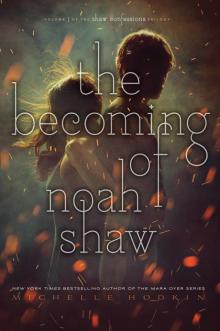 The Becoming of Noah Shaw
The Becoming of Noah Shaw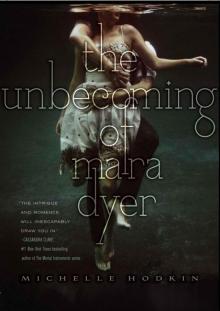 The Unbecoming of Mara Dyer
The Unbecoming of Mara Dyer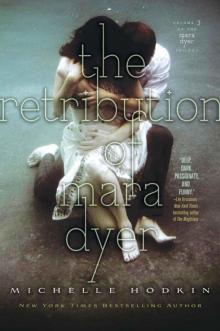 The Retribution of Mara Dyer
The Retribution of Mara Dyer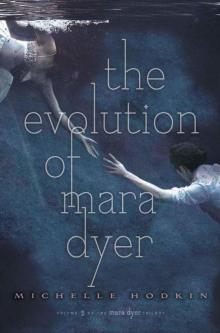 The Evolution of Mara Dyer
The Evolution of Mara Dyer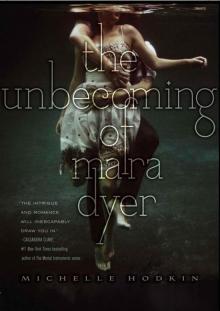 The Unbecoming of Mara Dyer md-1
The Unbecoming of Mara Dyer md-1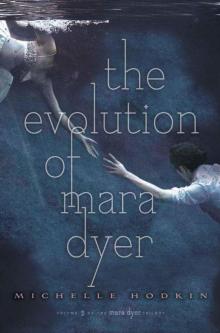 The Evolution of Mara Dyer md-2
The Evolution of Mara Dyer md-2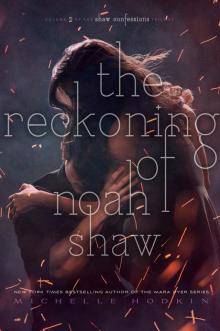 The Reckoning of Noah Shaw
The Reckoning of Noah Shaw